#sources of revenue for creators
Text
“If you’re a critical dsmp fan that’s okay” is a really weird take to me just because it’s like.... what is there other than the stuff to criticize really? I feel like when you critically consume content the point of that is that there is something of concrete value that outweighs the subject of criticism.
What is there of substance here it’s just racist weirdos goofing around in minecraft? You can find way better SMPs. Hell get your friends to make minecraft stories with you they’re just way more interesting than whatever these sentient bottles of mayonnaise are coming up with
#dsmp tw#like there's some shit that's less 'i critically consume this'#and more 'this is trash I'm digging through and some of it is kind of interesting'#and like#ok if you must dig through trash sometimes I get it our fictives do that with their sources a lot but like#what's key about that is that you don't fanpost about it or give the creator any acknowledgement/support#there's a huge difference between critically consuming like#idk a n3il g@iman book#or an anime that has a lot of fanservice in it or something or like#idk things that make valid points and are worthy of discussion where those discussions also do not like. go directly into people's pockets#as ad revenue or fan engagement#just why fucking bother at that point when there's so much better you can find
4 notes
·
View notes
Text
So, let me try and put everything together here, because I really do think it needs to be talked about.
Today, Unity announced that it intends to apply a fee to use its software. Then it got worse.
For those not in the know, Unity is the most popular free to use video game development tool, offering a basic version for individuals who want to learn how to create games or create independently alongside paid versions for corporations or people who want more features. It's decent enough at this job, has issues but for the price point I can't complain, and is the idea entry point into creating in this medium, it's a very important piece of software.
But speaking of tools, the CEO is a massive one. When he was the COO of EA, he advocated for using, what out and out sounds like emotional manipulation to coerce players into microtransactions.
"A consumer gets engaged in a property, they might spend 10, 20, 30, 50 hours on the game and then when they're deep into the game they're well invested in it. We're not gouging, but we're charging and at that point in time the commitment can be pretty high."
He also called game developers who don't discuss monetization early in the planning stages of development, quote, "fucking idiots".
So that sets the stage for what might be one of the most bald-faced greediest moves I've seen from a corporation in a minute. Most at least have the sense of self-preservation to hide it.
A few hours ago, Unity posted this announcement on the official blog.
Effective January 1, 2024, we will introduce a new Unity Runtime Fee that’s based on game installs. We will also add cloud-based asset storage, Unity DevOps tools, and AI at runtime at no extra cost to Unity subscription plans this November.
We are introducing a Unity Runtime Fee that is based upon each time a qualifying game is downloaded by an end user. We chose this because each time a game is downloaded, the Unity Runtime is also installed. Also we believe that an initial install-based fee allows creators to keep the ongoing financial gains from player engagement, unlike a revenue share.
Now there are a few red flags to note in this pitch immediately.
Unity is planning on charging a fee on all games which use its engine.
This is a flat fee per number of installs.
They are using an always online runtime function to determine whether a game is downloaded.
There is just so many things wrong with this that it's hard to know where to start, not helped by this FAQ which doubled down on a lot of the major issues people had.
I guess let's start with what people noticed first. Because it's using a system baked into the software itself, Unity would not be differentiating between a "purchase" and a "download". If someone uninstalls and reinstalls a game, that's two downloads. If someone gets a new computer or a new console and downloads a game already purchased from their account, that's two download. If someone pirates the game, the studio will be asked to pay for that download.
Q: How are you going to collect installs?
A: We leverage our own proprietary data model. We believe it gives an accurate determination of the number of times the runtime is distributed for a given project.
Q: Is software made in unity going to be calling home to unity whenever it's ran, even for enterprice licenses?
A: We use a composite model for counting runtime installs that collects data from numerous sources. The Unity Runtime Fee will use data in compliance with GDPR and CCPA. The data being requested is aggregated and is being used for billing purposes.
Q: If a user reinstalls/redownloads a game / changes their hardware, will that count as multiple installs?
A: Yes. The creator will need to pay for all future installs. The reason is that Unity doesn’t receive end-player information, just aggregate data.
Q: What's going to stop us being charged for pirated copies of our games?
A: We do already have fraud detection practices in our Ads technology which is solving a similar problem, so we will leverage that know-how as a starting point. We recognize that users will have concerns about this and we will make available a process for them to submit their concerns to our fraud compliance team.
This is potentially related to a new system that will require Unity Personal developers to go online at least once every three days.
Starting in November, Unity Personal users will get a new sign-in and online user experience. Users will need to be signed into the Hub with their Unity ID and connect to the internet to use Unity. If the internet connection is lost, users can continue using Unity for up to 3 days while offline. More details to come, when this change takes effect.
It's unclear whether this requirement will be attached to any and all Unity games, though it would explain how they're theoretically able to track "the number of installs", and why the methodology for tracking these installs is so shit, as we'll discuss later.
Unity claims that it will only leverage this fee to games which surpass a certain threshold of downloads and yearly revenue.
Only games that meet the following thresholds qualify for the Unity Runtime Fee:
Unity Personal and Unity Plus: Those that have made $200,000 USD or more in the last 12 months AND have at least 200,000 lifetime game installs.
Unity Pro and Unity Enterprise: Those that have made $1,000,000 USD or more in the last 12 months AND have at least 1,000,000 lifetime game installs.
They don't say how they're going to collect information on a game's revenue, likely this is just to say that they're only interested in squeezing larger products (games like Genshin Impact and Honkai: Star Rail, Fate Grand Order, Among Us, and Fall Guys) and not every 2 dollar puzzle platformer that drops on Steam. But also, these larger products have the easiest time porting off of Unity and the most incentives to, meaning realistically those heaviest impacted are going to be the ones who just barely meet this threshold, most of them indie developers.
Aggro Crab Games, one of the first to properly break this story, points out that systems like the Xbox Game Pass, which is already pretty predatory towards smaller developers, will quickly inflate their "lifetime game installs" meaning even skimming the threshold of that 200k revenue, will be asked to pay a fee per install, not a percentage on said revenue.
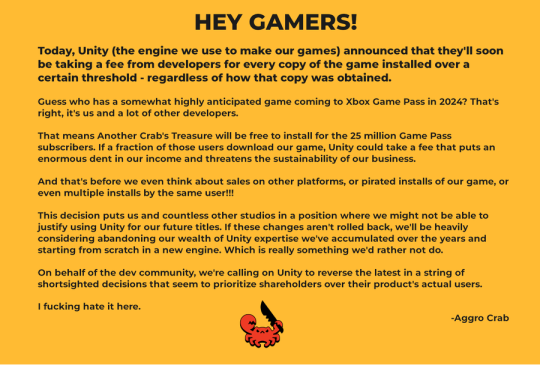
[IMAGE DESCRIPTION: Hey Gamers!
Today, Unity (the engine we use to make our games) announced that they'll soon be taking a fee from developers for every copy of the game installed over a certain threshold - regardless of how that copy was obtained.
Guess who has a somewhat highly anticipated game coming to Xbox Game Pass in 2024? That's right, it's us and a lot of other developers.
That means Another Crab's Treasure will be free to install for the 25 million Game Pass subscribers. If a fraction of those users download our game, Unity could take a fee that puts an enormous dent in our income and threatens the sustainability of our business.
And that's before we even think about sales on other platforms, or pirated installs of our game, or even multiple installs by the same user!!!
This decision puts us and countless other studios in a position where we might not be able to justify using Unity for our future titles. If these changes aren't rolled back, we'll be heavily considering abandoning our wealth of Unity expertise we've accumulated over the years and starting from scratch in a new engine. Which is really something we'd rather not do.
On behalf of the dev community, we're calling on Unity to reverse the latest in a string of shortsighted decisions that seem to prioritize shareholders over their product's actual users.
I fucking hate it here.
-Aggro Crab - END DESCRIPTION]
That fee, by the way, is a flat fee. Not a percentage, not a royalty. This means that any games made in Unity expecting any kind of success are heavily incentivized to cost as much as possible.

[IMAGE DESCRIPTION: A table listing the various fees by number of Installs over the Install Threshold vs. version of Unity used, ranging from $0.01 to $0.20 per install. END DESCRIPTION]
Basic elementary school math tells us that if a game comes out for $1.99, they will be paying, at maximum, 10% of their revenue to Unity, whereas jacking the price up to $59.99 lowers that percentage to something closer to 0.3%. Obviously any company, especially any company in financial desperation, which a sudden anchor on all your revenue is going to create, is going to choose the latter.
Furthermore, and following the trend of "fuck anyone who doesn't ask for money", Unity helpfully defines what an install is on their main site.
While I'm looking at this page as it exists now, it currently says
The installation and initialization of a game or app on an end user’s device as well as distribution via streaming is considered an “install.” Games or apps with substantially similar content may be counted as one project, with installs then aggregated to calculate the Unity Runtime Fee.
However, I saw a screenshot saying something different, and utilizing the Wayback Machine we can see that this phrasing was changed at some point in the few hours since this announcement went up. Instead, it reads:
The installation and initialization of a game or app on an end user’s device as well as distribution via streaming or web browser is considered an “install.” Games or apps with substantially similar content may be counted as one project, with installs then aggregated to calculate the Unity Runtime Fee.
Screenshot for posterity:

That would mean web browser games made in Unity would count towards this install threshold. You could legitimately drive the count up simply by continuously refreshing the page. The FAQ, again, doubles down.
Q: Does this affect WebGL and streamed games?
A: Games on all platforms are eligible for the fee but will only incur costs if both the install and revenue thresholds are crossed. Installs - which involves initialization of the runtime on a client device - are counted on all platforms the same way (WebGL and streaming included).
And, what I personally consider to be the most suspect claim in this entire debacle, they claim that "lifetime installs" includes installs prior to this change going into effect.
Will this fee apply to games using Unity Runtime that are already on the market on January 1, 2024?
Yes, the fee applies to eligible games currently in market that continue to distribute the runtime. We look at a game's lifetime installs to determine eligibility for the runtime fee. Then we bill the runtime fee based on all new installs that occur after January 1, 2024.
Again, again, doubled down in the FAQ.
Q: Are these fees going to apply to games which have been out for years already? If you met the threshold 2 years ago, you'll start owing for any installs monthly from January, no? (in theory). It says they'll use previous installs to determine threshold eligibility & then you'll start owing them for the new ones.
A: Yes, assuming the game is eligible and distributing the Unity Runtime then runtime fees will apply. We look at a game's lifetime installs to determine eligibility for the runtime fee. Then we bill the runtime fee based on all new installs that occur after January 1, 2024.
That would involve billing companies for using their software before telling them of the existence of a bill. Holding their actions to a contract that they performed before the contract existed!
Okay. I think that's everything. So far.
There is one thing that I want to mention before ending this post, unfortunately it's a little conspiratorial, but it's so hard to believe that anyone genuinely thought this was a good idea that it's stuck in my brain as a significant possibility.
A few days ago it was reported that Unity's CEO sold 2,000 shares of his own company.
On September 6, 2023, John Riccitiello, President and CEO of Unity Software Inc (NYSE:U), sold 2,000 shares of the company. This move is part of a larger trend for the insider, who over the past year has sold a total of 50,610 shares and purchased none.
I would not be surprised if this decision gets reversed tomorrow, that it was literally only made for the CEO to short his own goddamn company, because I would sooner believe that this whole thing is some idiotic attempt at committing fraud than a real monetization strategy, even knowing how unfathomably greedy these people can be.
So, with all that said, what do we do now?
Well, in all likelihood you won't need to do anything. As I said, some of the biggest names in the industry would be directly affected by this change, and you can bet your bottom dollar that they're not just going to take it lying down. After all, the only way to stop a greedy CEO is with a greedier CEO, right?
(I fucking hate it here.)
And that's not mentioning the indie devs who are already talking about abandoning the engine.
[Links display tweets from the lead developer of Among Us saying it'd be less costly to hire people to move the game off of Unity and Cult of the Lamb's official twitter saying the game won't be available after January 1st in response to the news.]
That being said, I'm still shaken by all this. The fact that Unity is openly willing to go back and punish its developers for ever having used the engine in the past makes me question my relationship to it.
The news has given rise to the visibility of free, open source alternative Godot, which, if you're interested, is likely a better option than Unity at this point. Mostly, though, I just hope we can get out of this whole, fucking, environment where creatives are treated as an endless mill of free profits that's going to be continuously ratcheted up and up to drive unsustainable infinite corporate growth that our entire economy is based on for some fuckin reason.
Anyways, that's that, I find having these big posts that break everything down to be helpful.
#Unity#Unity3D#Video Games#Game Development#Game Developers#fuckshit#I don't know what to tag news like this
6K notes
·
View notes
Text
50 Best Ways to monetize your content and earn money from YouTube Channel in 2023
If you’re a content creator looking to monetize and earn money from YouTube channel, you’re not alone. With over 2 billion monthly active users, YouTube is a goldmine of opportunities to reach a global audience and earn money through a variety of revenue streams. But with so many ways to monetize your content, it can be overwhelming to decide which ones to pursue.
In this article, we’ve compiled…

View On WordPress
#50 proven ways to monetize your YouTube channel#Creative ways to monetize your content on YouTube#How to earn money on YouTube#Make money from your YouTube channel#Monetize your YouTube channel in 2023#Monetizing your YouTube content: Tips and tricks#Secrets to earning money on YouTube in 2023#YouTube income sources for content creators#YouTube monetization strategies#YouTube revenue streams for content creators
1 note
·
View note
Text
@ everyone who is catastrophizing: they're not taking their old content off youtube:
However, according to Bergara, Watcher is not fully exiting YouTube: It will still keep its backlog of videos on YouTube, and going forward will put the first episodes of new seasons on YouTube — while the full new seasons will be exclusively available on the Watcher streamer.
Source: VARIETY ARTICLE LINKED RIGHT HERE READ IT
also yes, i am sure they have thought this through, carefully and with much discussion with their staff, their partners and themselves. this is not a decision taken lightly or without deep consideration.
unfortunately, they, like all the rest of us, are allowed to make a living and their 27 staff and employees are also allowed to make a living. episodes of Ghost Files, as an example, cost hundreds of thousands of dollars to make. neither the patreon nor the youtube ad revenue, even combined, cover that + their additional overhead.
i'm sorry to folks who cannot afford the new subscription service, but the boys have also encouraged password and account sharing, so i suggest you hook up with a couple of fandom friends and share an account the way i am going to.
there's a real disconnect in this fandom about the true costs associated with the content that we enjoy and have consumed, essentially for free, for years. that watcher was even able to remain sustainable as the youtube landscape became more and more hostile to creators who did not make clickbait nonsense, is amazing. this is a necessary and vital change to the model in which their content is released. it gets them out from under the youtube algo, keeps them from being demonetized and getting nothing at all for a video that costs tens of thousands of dollars to make, and will hopefully free them up to be able to pursue things they have been unable to pursue while being tied into the youtube space.
sorry that you are no longer getting content for free, but being able to directly pay the creators of the content for their time, energy, and effort, is way more appealing to me than having to watch fucking unskippable youtube ads about sports betting.
377 notes
·
View notes
Text
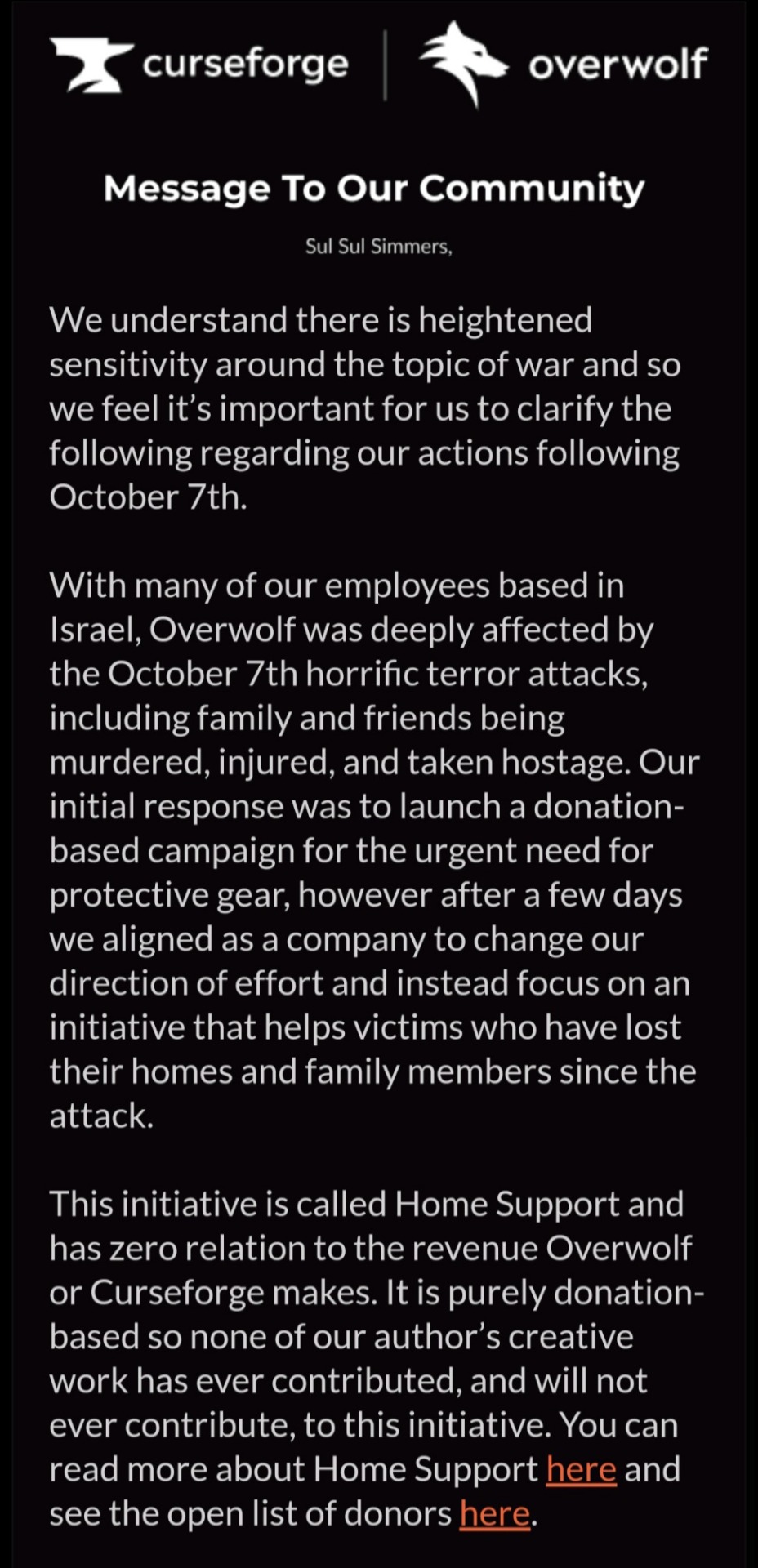
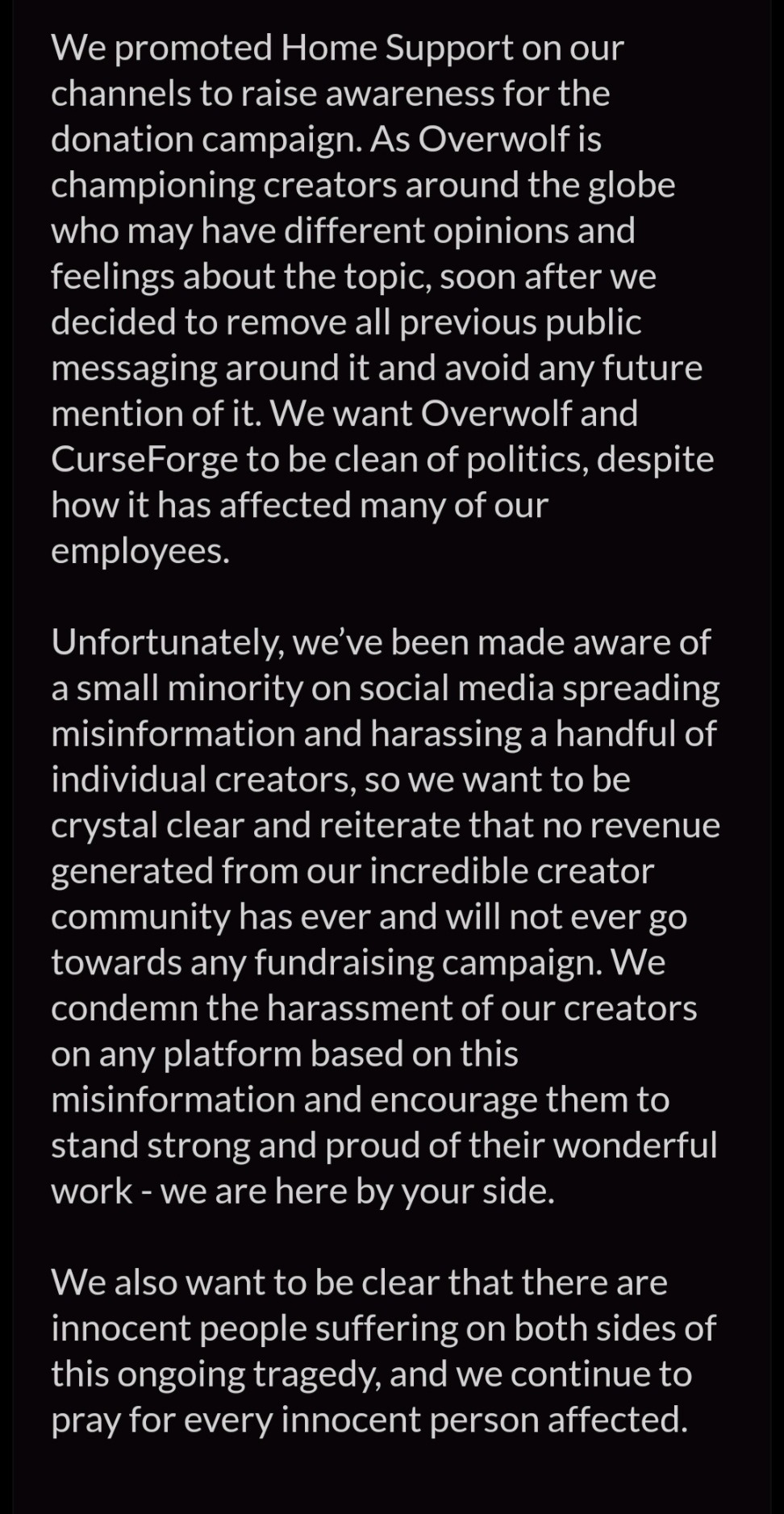
Statement from Overwolf
...Okay, first of all, this whole statement is sadly nothing but them taking the same exact route as before: misdirecting & changing the narrative to only be about "victims" when their Home Support initiative is partnered with the ILF, an openly Zionist organization. This isn't about innocent parties only when they're partnered with an organization that contributes directly towards IDF Military Intelligence. All of the money from the fund goes to the ILF's bank account to distribute, per their own FAQ page. And even without that, the association alone is enough to boycott. Overwolf and Curseforge cannot be "clean of politics" while their CEO partners with and therefore directly supports Zionist parties.
Screenshots directly from Home Support website & ILF website
This statement overall stinks because it puts the blame fully onto people with legitimate concerns by calling them all harassers. Have some people gone too far towards creators? 100%. I know that well. But Overwolf is clearly using that to deflect off of themselves, and this is why it never should have been done in the first place. Y'all focused on the wrong shit- the smaller targets instead of the big ones, and the wrong claim that they're directly funding the IDF with CF revenue, and now they're doing exactly what I said they would: once again using the fact that that's not technically true to weasel out of people's concerns. They even directly call out the fact that it's misinformation like I said they would! They clarified fucking nothing, they repeated the same shit they already said because they know they can. We need to change the focus of the boycott so that they are forced to address their actual wrongdoing! Stop spending all your time sending threatening messages on anon and instead spread factual information with sources and reach out to creators in good faith effort to get them to speak without the fear of being attacked. They will stay silent as long as the negative consequences (financially & socially) is all on them and not Overwolf & EA.
I'm still working on a comprehensive post with everything, but in the meantime, please spread this post around.
#ceci speaks#nonsims#text#important#the curseforge issue#boycott stuff#curseforge boycott#i hate being right but what can i say#tumblr fucking up another thing by not understanding boycotts and reacting to any criticism with middle school hostility?#say it aint so!#god this message is so fucking slimy#maybe they read my posts lmfao#or maybe im just that spot on with shady ass parties bc damn#yall were on my ass hardcore werent ya but i told u so!!!!!#curseforge#overwolf#overwolf boycott
182 notes
·
View notes
Text
Hey Tennessee fandom people: the ELVIS Act getting ready to go through. It prevents you from using likenesses of Public Figures and their voices. It's Supposed to target AI of musicians and actors but it's written So Broadly that it can effect things like Political News Reporting, Political Parody, AMVs, Fan Edits, and of course Fan Art. It's not limited to Tennessee households either so a Hollywood company can relocate a headquarters or branch to Tennessee and use Tennessee law to sue people outside the state.
If you care about any of that, then look up your county's/district's representatives in the Tennessee Senate and House and start calling. It's headed to General Assembly.
Specifically the bill says - no one can use a famous person's likeness or voice without that actor's permission for the actors life plus 10 years - .
You can see how likeness and voice can be broadly applied and of course fans would never be able to get permission for fan content.
Surely you can see how this would affect amvs and fan edits on places like Instagram.
It would also affect things like Fan Art for Live Action Series.
This would limit free use for things like parody which would effect comedy too.
It's named after Elvis and claims to be for the entertainment industry but it's written so broadly so that it can be used by public figures in general. So Politicians would be covered under it.
Honestly politicians are trying to get this passed in Tennessee to limit the use of their own likenesses for things like memes because it's a fairly easy state to get ultra conservative bullshit passed.
Here's some more info from Real Clear Policy writer Hannah Cox:
"
Right of publicity laws typically include stringent, clear exceptions and only apply to advertising, merchandise, and fundraising purposes. Those exceptions are for “newsworthy” images in content that provides a “public interest,” which encompasses everything from hard news to documentaries, to satire, to celebrity gossip.
This is a fantastic structure that ensures an individual has a right to their own personhood while also upholding the First Amendment, its protections for free expression and freedom of the press, and ensuring the public has easy, fast access to information.
The ELVIS Act doesn’t include these provisions. As currently written, filmmakers would have to obtain permission from nefarious actors like Jeffrey Epstein’s estate in order to make a documentary about him. The producers of Forrest Gump wouldn’t be able to include all those scenes with historic figures.
That’s a really good way to protect powerful people from scrutiny. And it would severely stagnate the flow of information online as even obtaining such permissions could take weeks. Additionally, out of fear, many content creators would simply play it safe out of fear of litigation.
The ELVIS Act also does not limit its reach to those living or dead, nor does it restrict its parameters to those with a Tennessee domicile. This seems like an open plea for people to infiltrate the state with ridiculous lawsuits that wouldn’t make it past the first gate elsewhere. It’s almost like the trial lawyers associations wrote this bill instead of Hollywood unions.
But to be clear, this was brought to the Republican legislature by the music industry associations and Hollywood unions - a peculiar entity for conservative lawmakers to be carrying water for to say the least. What these entities really want is an end to Fair Use practices because they’re bleeding money, and instead of making better products or creating new revenue sources, they’re simply being lazy and attempting to restrict the market.
"
--
When you call: You're a concerned republican worried about how limiting AI can hurt small business and how the law should be written more specifically and Exceptions Should be included To Protect Fair Use for Non-Commercial, News, and Parody use, because all are integral to Free Speech.
The Law is Simply Too Broad the way that it's written now and it limits Facebook campaign support for Republicans if they have to get permission from Liberals to use their likenesses. It limits free speech which is integral to preaching God's good word against his disbelievers in a political setting and you won't stand by a politician that limits your freedoms like that. This is America Land of the Free and you'll be damned if you let someone step on you like that. That its Big Government infringing on your rights as an American instead of sensible small government.
--
If you dont live in Tennesse this will still affect you with the ways it's written. It doesn't take much for companies to set up "official" shop in a new state.
It will also ABSOLUTELY be used as the model for a much worse NATIONAL bill if it gets passed in Tennessee. Because Politicians will see that it already succeeded once and HollyWood and the Music Industry are two lobbies FLUSH with cash for bribes and campaign donations.
Mark my words this will absolutely bleed over into national politics which will be devastating for News Reporting and informing the populace which is ALREADY in awful shape.
#Tennessee#ELVIS Act#Jesus christ we're getting jumped from every fucking direction. this year is fucking terrible#KOSA#stop kosa#stop csam
141 notes
·
View notes
Text
unity thinks theyre being so cute stressing the threshold where programs are only subject to the fee after $200K in the past 12 months of sales as well as 200K downloads [source]. like "this won't hurt small productions, only BIG ones. like nintendo! why would you care about defending their bottom line? destroy megacorps, right? there is no common interest there. their concerns are not yours! don't worry about it!"
and the thing is, they're right--you're totally groovy and unaffected if your game makes up to $199,999.99 in a year. but the moment you hit $200K, you are subject to a linear fee with no cap. you have to pay that fee as many times as the game gets installed, which is not a number that is strictly tied to your revenue.
after $200k, anyone can mount a malicious campaign to install as many instances of a program as possible to cost the creator. people inside unity have particular incentive to incite this sort of campaign, since the money goes to them.
how long until some dickhead makes a list of queer-led productions using unity and writes up a script that just uninstalls and reinstalls their games over and over again? how much do you want to bet some dickhead has already done it and is just waiting for january 1st? how many of their friends do you think they can get to run it in the background while they go about their business?
unity is instating a blackjack threshold on games sales. try your luck and go as high as you can, but if you hit $200K, you lose. bigots, trolls, and bad actors of all stripes can hit you with that fee as many times as they have the time and botpower for.
318 notes
·
View notes
Note
I’ve been getting tired of webcomics and wanting to move to print for awhile and with Webtoon’s issues I really want to get away from it now but I don’t know where I can buy them without knowing the exact title. Are there any good websites that categorizes print comics by genre? Or maybe youtube channels that give synopsis’ of different print comics?
I mean, Webtoons the company is not interchangeable with webcomics as a medium. If I can say this as gently as possible, I don't think you should discount webcomics as a medium just because WT sucks ass. Many print comic creators are still webcomic creators and rely on whatever traffic they can pull online, with print versions being an additional revenue source.
So my real advice is just that if you're reading any webcomics that you really enjoy and have print versions, please consider buying them if you want to support the creator beyond just whatever platform they're posting to. And if they're not bound by an Originals contract and have their own independent sites, bookmark and use them!
There are also digital publishers that offer print books from both trad artists and webcomic artists as well, such as Hiveworks and Image Comics, so I highly recommend checking out their libraries.
Point the finger at Webtoons(tm), not webtoons and webcomics. Webcomics are an amazing medium that are accessible to all regardless of skill level, background, or storytelling style - they are much larger than Webtoons, as much as WT may be trying to change that narrative and control the medium as a monopoly. I hope, despite everything WT is doing to its creators and readers alike, you don't give up on webcomics as a medium <3
67 notes
·
View notes
Text
Games engines and their pricings for Indie Devs
Based on Unitys recent changes to their pricing model, I thought it would be useful to put together a list of different game making softwares and their pricing models to compare which would be best for you.
Unreal
Programming language: C++ and visual scripting.
Dimensions: 3D, VR and AR
Platforms: all platforms
Standard license: free to use, pay 5% of your revenue over $1 million over the lifetime of the game, due each quarter (as long as the game is still for sale or generates more them $10k per quarter)
Enterprise: $1.5k+ per seat per year, includes premium support and private training and/or custom licensing terms
Custom licenses: larger developers can renegotiate with epic for lower or waived royalty fees.
More about their licensing here
Gamemaker
Programming language: GML and visual scripting
Dimensions: 2D
Gamemaker doesn't require any royalties made off of your game no matter which license youre on.
Free: access to gamemaker and export that can only be used on their games website (GX.games)
Creator: access to game maker, GX export and desktop export $4.99 a month
Indie: access to the above with web and mobile exports, $9.99 a month.
Enterprise: all of the above but with console exports as well $79.99 a month.
Godot
Programming languages: GDScript, C# and C++
Dimensions: 2D, 3D, AR and VR
Platforms: Not able to port to console due to it being open source unless you develop it yourself or via a third party.
Royalty free and free at point of purchase.
RPG maker
Programming language: Java and visual scripting
Dimensions: 3D (in some), 2D
Platforms: windows, mac, web
Doesn't ask for royalties from games, has a 20 day free trial. RPG maker MZ costs £66.99 initial purchase, costs may vary by which engine you buy.
CryEngine
Programming language: C++
Dimensions: 2D, 3D, VR and AR.
Platforms: Windows, Linux, PlayStation 4, Xbox One, Oculus Rift, OSVR, PSVR, and HTC Vive. Mobile support is in development.
5% royalty fee over $5k a year, free to download and use.
Cocos2D
Programming languages: C++, C#, Lua and javascript
Dimensions: 2D
Platforms: android, mac, linux, and win32.
Free to use, no royalties
Cocos creator
Programming languages: TypeScript and JavaScript
Dimensions: 2D and 3D
Platforms: IOS, android, windows, mac, HTML5
Free to use, no royalties
Defold
Programming languages: Lua 5.1 and LuaJIT
Dimensions: 2D and 3D
Platforms: PlayStation®4, Nintendo Switch, Android, iOS, macOS, Linux, Windows, Steam, HTML5, Facebook, Q3 2023 PlayStation®5, Q2 2024 XBox
Free to use, no royalties
Phaser
Dimensions: 2D
Programming languages: JavaScript or TypeScript
Platforms: Web (HTML5)
Free to use, no royalties
Unity
Programming language: C#
Platforms: all platforms
Dimensions: 2D, 3D, VR and AR
Edit: unity has changed their policy you can see the new one here

174 notes
·
View notes
Text
Hi Nay Act 3 Animation
Never a bad day to repost this animation I did for our fundraiser! Also never a bad day to remind people to listen to Hi Nay ;)
~Motzie
We're on Acast, all other podcast platforms, AND Youtube!
We're still very much an indie production (because ad revenue is no longer a viable source of funds for most online creators unless you get hundreds of thousands / millions of listens per episode and we're too openly political for most sponsors) so if you'd like to support us and help us make Hi Nay's production sustainable, check out our P4treon!
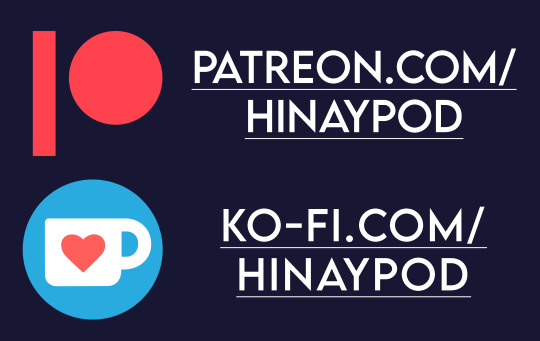
You can get lots of bonus stuff over there, and early access to episodes 3 days ahead of posting! It's a great time. It's also our primary source of funds for our production and our fantastic cast.
And if you can't subscribe but still want to contribute, you can always throw us a few dollars over on Ko-Fi! We appreciate all the help.
#hinaypod#hi nay podcast#animation#2D animation#horror podcast#audio drama#hi nay#It would be very cool if we didn't need money to operate but... unfortunately...#filipino podcast#queer podcast#hi nay art
71 notes
·
View notes
Text
How Viviziepop kickstarted the third wave of indie animation.
Okay, I've been seeing a lot of people talk about the tweet below and how Viv doesn't deserve to take credit for the success of other indie animation projects online but the fact of the matter is...she does, in an indirect way at least.
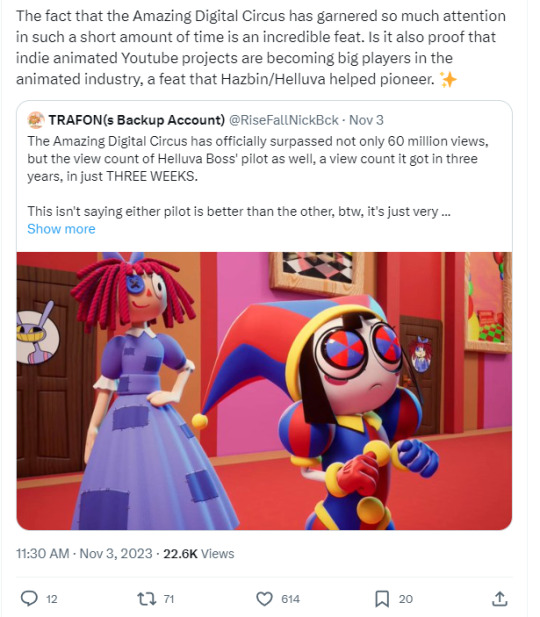
First, let's start off with a brief history of indie animation:
everything started out on a site called newgrounds, I'm sure you've all heard of it. Created by Tom Fulp in the 90s to show case some of his half baked game ideas. Which eventually evolved into a place where indie creators could post anything they wanted without fear of censorship; the rating system that automatically removed any posts that dropped too low being the only source of quality control.

This gave indie animation it's initial foothold online but without any way of obtaining a revenue stream it never really moved beyond a fun hobby done to practice one's art/coding skills or just screw around with friends online.
This problem got more significant as time went on and many of the teenage artists that gave newgrounds it's inital success, such as RicePirate and Tom Fulp, grew into young adults who needed a revenue stream. Luckily they found one in the form of youtube.
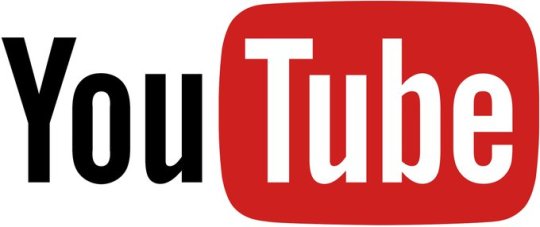
With these monetization policies, many indie animators were actually able to go into animation practically full time. Their pre-existing income bolstered by that of youtube and what followed was a golden era of animation, just an explosion of content across the board. You had stuff like Eddsworld, Salad Fingers, ASDF movie, and tons of other creators bursting onto the scene.

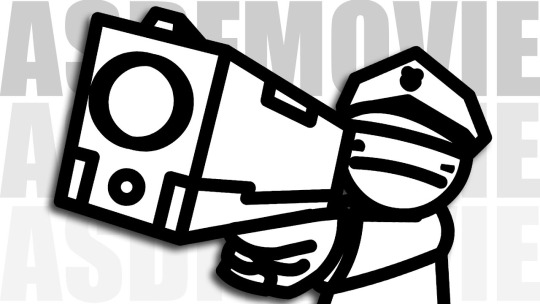
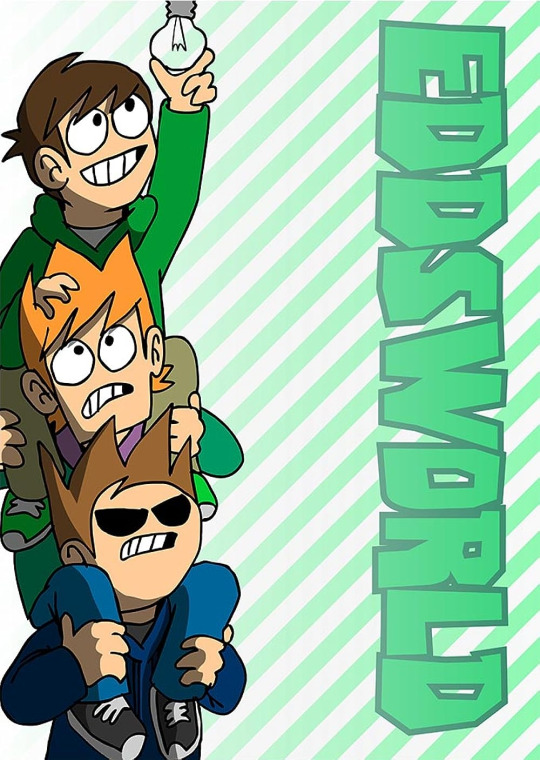
all putting their content out there on Youtube for the world to see. All bolstered by revenue coming in from Youtube...but the good times never last
See, back then youtube's monetization policies were pretty simple: the more views your channel got, the more money you'd make. Great for short form animators and also great for clickbait youtubers who abused the system with deceiving thumbnails and titles!
To combat this, Youtube changed it's monetization policies in March of 2012: instead of being rewarded on view count, monetization would instead reward the time watched during a video. Which created a system where longer videos with frequent uploads were rewarded
In theory this was supposed to stop clickbait videos as people would just watch for a few seconds and leave. But in practice? It meant that animators were put at a heavy disadvantage as now they'd have to put in significantly more work for the same result.
This caused a complete and total crash of indie animation online. Between an unfair algorithm and the rise of gaming channels, most indie animators couldn't gather the same level of funding they could before and had to either quit or scale back.
Only the big name animators who could coast by on brand recognition such as Harry Partridge and TomSka among several others, or larger channels with dedicated teams similar to tv studios such as Mondo Media and Rooster Teeth. Were able to keep going.
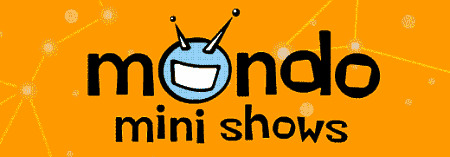
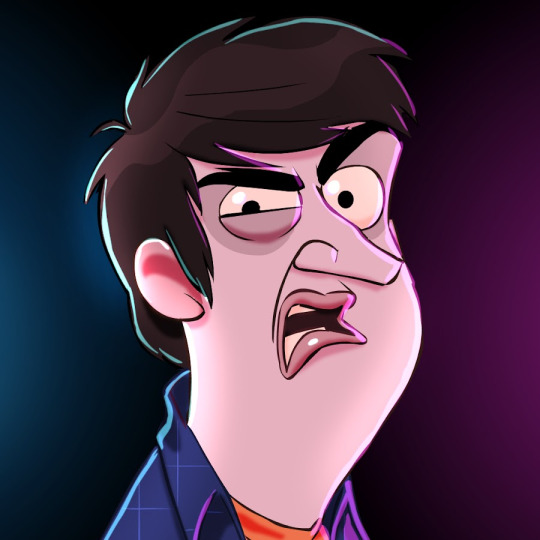
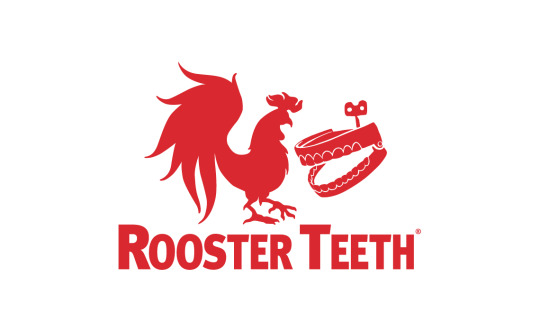
This started a brief dark age for online animation until the advent of story time animators. People like Jaiden Animations, Swoozie, and TheOdd1sOut who relied on simplistic art styles with minimalist animation that focused on content reminiscent of old vlogs where the animators simply share stories from their everyday lives that allowed them to put out longer videos faster; thus working around the monetization system that had put so many animators out in the cold.
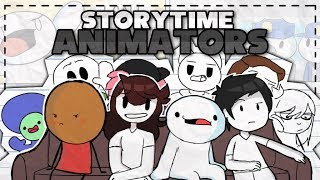
While they didn't solve the problem, in some ways they made it worse by starting a trend that attracted countless copycats, they did help sustain an interest in indie animation online and ensure there was a consistent audience for such a medium.
Now it wasn't a total wasteland mind you, as I said there were still plenty of animators who survived the purge. There were even a few channels such as Shut Up Cartoons and Mondo Media, again, that helped produce dozens of animated series from indie creators.
But even at it's best, these series were still very amateurish. The passion was obviously there but these were still very simplistic flash or stop motion animations with low budgets and small teams, focusing more on episodic skits than any sort of overarching plot
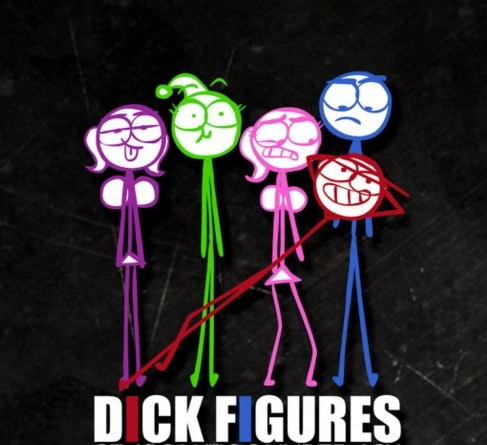
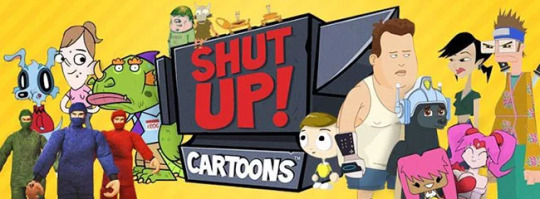
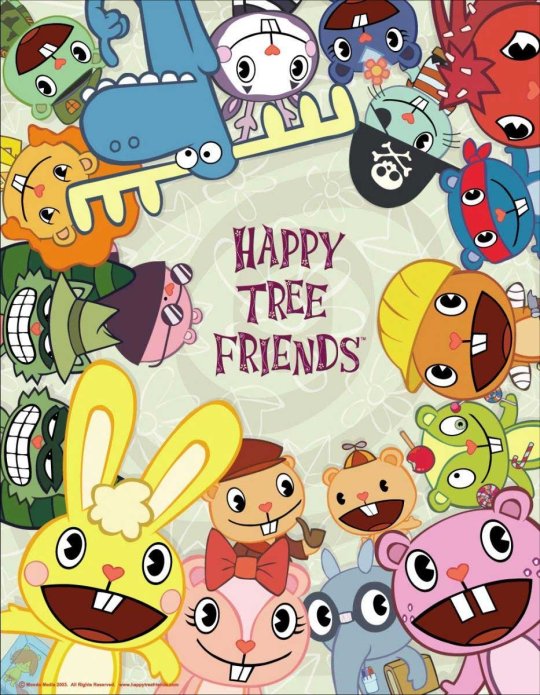

This environment of amateur passion projects, where animated series were usually very small scale and never really escaped from the limited sphere of youtube, went on for several years and kept the animation community alive. Until Viv posted Hazbin Hotel and brought about the third wave of indie animation.
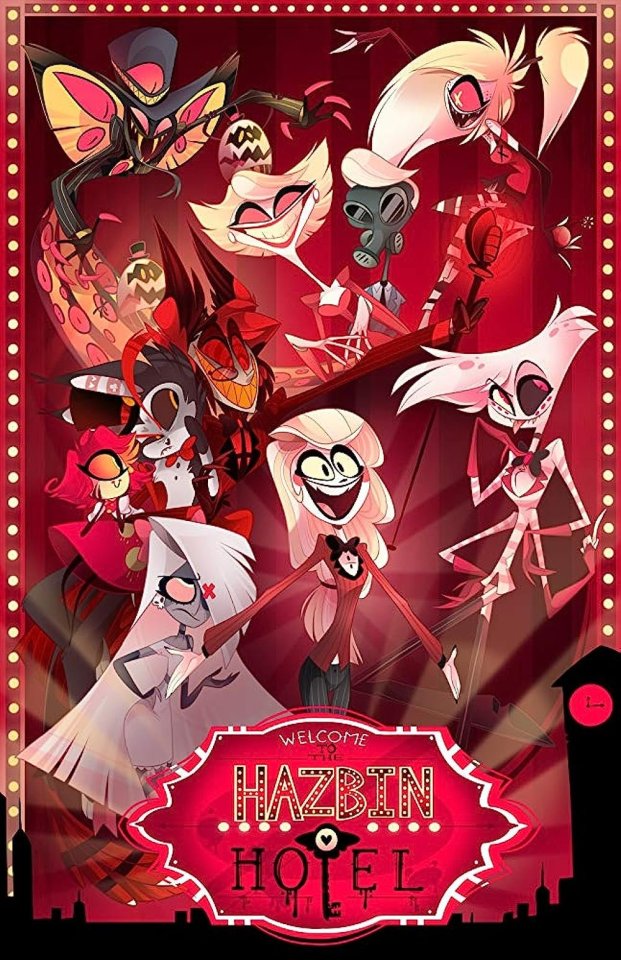
Unlike the previous examples, Hazbin Hotel was a VERY different beast from most indie animation. Not only did it have an extremely distinct visual style but the animation was so fluid, so professionally made, it felt like something you'd see out of a mainstream studio. It felt leagues above the average indie project in terms of quality.
Now Viv had already a decent audience from her Zoophobia webcomic, her speed draws, and the die young video. So it wasn't like she was starting from nothing. But there was no denying that this new form of animation caught people's attention and caught it FAST.
You all can probably recall the explosion of discussion that surrounded the original pilot and how it was all the internet was talking about for awhile. Viv road that wave and used the momentum to launch 'Helluva Boss' another indie production with a similar style.

This made her even more popular, especially when she started cranking out new episodes of the latter series with the same high quality as before, and soon her fanbase swelled to millions. A fanbase that was more than happy to crowdfund Viv's work through patreon and merch sales. Then other animators saw this and realized that there was a sizable audience for animated content; one that could not only sustain professional level animation, but was desperate for more content of this scale. Soon several other series started cropping up like MurderDrones, Lackadaisy, Monkey Wrench, and the Amazing Digital Circus. All of which followed Viv's lead of producing high quality, fluid animation with overarching plots that drew funding entirely from legions of online fans.
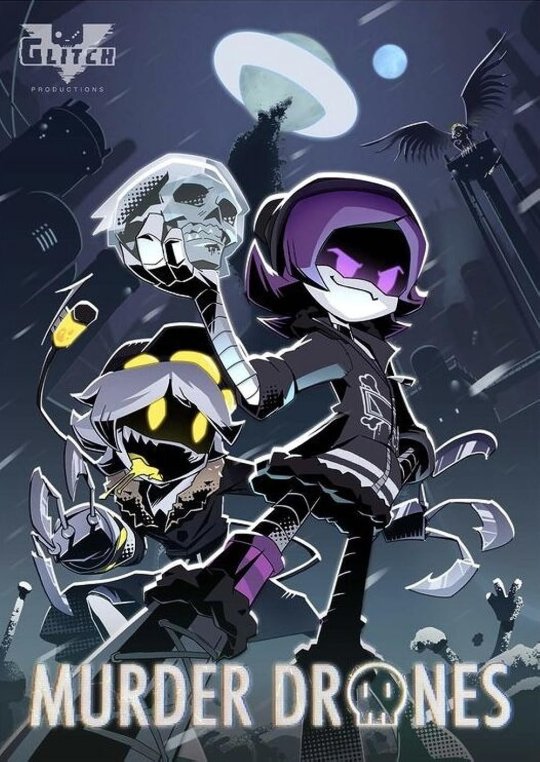
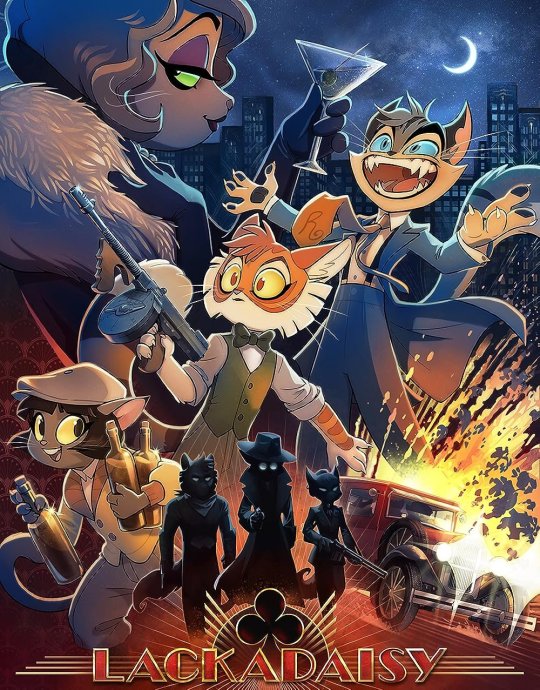
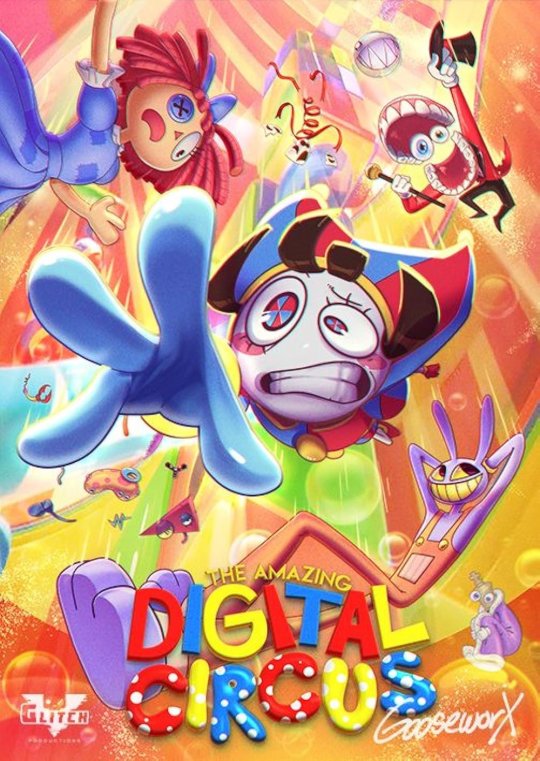
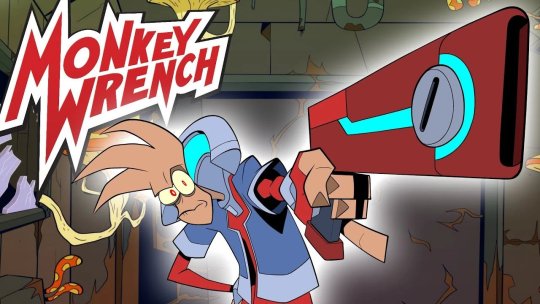
For the first time in a long time, indie animation was breaking out of it's original platform and reaching far more mainstream audiences than it ever has in the past on a scale never before seen and it's all because Hazbin Hotel and Helluva Boss kicked off this new animation renaissance!
Now I'm not gonna say Viv was solely responsible, the series we enjoy now have thrived primarily on their own merits and the creative minds behind them.
But as it stands, her work played a big role in setting the stage for other indie animation projects and creating the perfect conditions for them to thrive amidst the current digital landscape. Like it or not, Viv is the catalyst for modern indie animation. To deny Viv her rightful place in history out of spite is nothing short of historical revisionism.
Give the gal her due, she's done some amazing things for this crazy world we live in.

Here's the videos I got most of my info from, it's important to cite one's sources after all!
youtube
youtube
youtube
59 notes
·
View notes
Text
I found it interesting/annoying/funny that... with YouTube's adblocker popups, one of the points they want to try to make, to convince you to remove/disable your ad blocker, is that creators on YouTube make a living on the ad revenue from their hamfisted ad breaks with the videos you're watching.
To an extent, this is true, though it's not the sole source. They can't make their living on ad revenue alone. It's also just general viewership, sponsors and additional outside sources that help a creator be successful and continue making their living being a creator.
Not only that! Sponsorship ad space is weaved WITHIN the video you're watching, so both the creator and their sponsor benefit directly from any traffic gained from the creator putting it into their videos.
IMO, if a creator can creatively/flawlessly weave their sponsored ad into their video that makes me smile or chuckle, I'll let that ad ride instead of skipping ahead. Why not hear them out?
The ads that YouTube interrupts your viewing entertainment with? Blocked. Always.
66 notes
·
View notes
Text
Tron: The Animated Series (1986-1989)
What do you mean you haven't seen Tron: The Animated Series? It was my favorite cartoon when I was a kid!
So this all started as an exercise in how to explain why Sam inexplicably had merch for a 2010 movie in his 1989 house. In-universe there would have probably been toys using the 1982 aesthetic since that was what the video game used (and Sam DOES have an 82 Tron figure in his house!) but why the Grid stuff?
Enter THE CARTOON.
It was the 1980s everybody who was everybody made cartoons to sell toys. Encom made home gaming consoles by this point, and they would have had peripherals like Nintendo did. They had licensed characters like Nintendo did. You see where I am going.
Encom wants to sell Encom Gaming Power Gauntlets. Kevin wants to introduce kids to the ideas about the Digital Frontier since he's a futurist and knows kids will be mentally flexible enough to digest the new zeitgeist if it's fun and animated!
Production of the cartoon ran from Kevin's official retirement as CEO until his disappearance. Three official seasons with a fourth in production. Season three's airing was cut short due to the furor surrounding Kevin's going missing, but the "lost" final episodes of S3 were restored when the DVDs were eventually released for an anniversary collection.
The cartoon was also successful in syndication through the 1990s and early 2000s since it successfully anticipated the Educational/Informative movement-- Tron: The Animated Series actually does teach kids some of the basics of computer science around the silly adventure stuff. Think Captain Planet meets Captain N the Game Master for the overall tone of the series. It's not realistic, but you get the general concepts and issues.
The cartoon's popularity among millennials keeps Tron alive in pop culture to the present day. The IP remains a perennial revenue stream for Encom, and every so often they'll throw the fanbase something to keep the money going. (This is an ordeal to the program himself, since he has to deal with hackers sent by groups named after him on the reg.)
What's it about?
Young video game enthusiast Jethro "Jet" Keene lands himself the after school internship of a lifetime getting to work at Encom in a special new program for teenagers with attitude run by Kevin Flynn (voiced by himself).
However, it's not all fun and video game testing with the sweet new Encom Power Gauntlet. Thanks to some cartoon physics hijinks, Jet finds himself transported into the Grid, the Boss's new experimental computer system!
Jet gets to work with Clu (they hired a voice-alike for him) and Tron (ditto) to find a way back home to the real world, solving problems and learning how to code along the way... and that was the pilot episode.
Because this is a cartoon for children, Jet is naturally the regular User of the Grid instead of Flynn, though Flynn makes occasional appearances to dispense Yoda-like wisdom and is revered by all the programs inside the system as the Creator.
There are also no lasers or anything like that-- Jet does a silly toku-like thing with the power gauntlet to commute into the system.
Clu is more likable than in real life. He's mostly benevolent, trying to make a more perfect system but the show's writers actually picked up on the idea that making a perfect system is kind of an impossible lift and made it central to his character development. He's a little obsessed with copying the User world, and there's an arc in S3 where a lot of the conflict revolves around why can't programs be programs about it.
Tron's not a mayhem goblin, which is a crime. He's portrayed as a little bit Optimus Prime, since Jet's the primary mayhem source, and Fighting for the Users is otherwise his defining personality trait. He gets a surprisingly deep fate/free will arc in S2, since naturally several episodes revolve around attempts to reprogram him since he's the Champion and all. Afterward, he's a bit more chill.
Jet's storyline parallel's Kevin's real-life one a little bit-- a lot of the episodes focused on him as a character revolve around him trying to balance his double life.The cartoon also does not mention the time dilation jetlag. Jet, unlike Kevin, does learn how to ask for help, especially as S3 decides to diversify a little more and adds a girl intern, Paige.
S3 in general has a lot of emphasis on diversity and tolerance of others and their differences. The ISO-Basic tensions were running high in the real Grid. It was on Kevin's mind a lot. He was also starting to make thinks on introducing the ISOs to the rest of the world at the time.
Like Reboot in the 1990s, Tron has a lot of episodes devoted to video games and playing games on the Game Grid is a frequent trope. (Hardcore Tron partisans accuse Reboot of stealing this.) Unlike in Reboot, there's no derezzing the losers if the User wins. Games are sometimes the entire plot and sometimes an obstacle or diversion from solving an episode's actual problem.
Since the Grid is open in Tron, there is a recurring cast of villains in the form of viruses and hackers from other systems in addition to technical problems that have to be solved through coding and computer science know-how.
The fourth season didn't get much past a few animatics for the S4 pilot, but what was there got a release for the fancy anniversary collections as special features. Design docs indicate that some new characters were about to be introduced-- Jalen and Radia. Kevin Flynn disappeared while voice actors were being cast for these roles.
NGL I am extremely mad this wasn't a real cartoon.
#writing tag!#glowstick rave nonsense hours#mountains of pi#tron#tronblr#let's goooooo#troncharov#tron: tas
36 notes
·
View notes
Note
Nah copyright law was originally about protecting individual working writers’ ability to make money. One of the big early advocates for better copyright law was Dickens, bc people kept adding chapters and poems to his books and then selling them on the street like pirated VHS. This was happening to many writers, all the time. Dickens was paid by the word, Tin Pan Alley writers were paid by the sheet and had to hash out new copyright law when player piano scrolls became a steady source of revenue, etc etc.
The recording arts changed things for better or worse—but Disney in particular has done everything it can to lobby to keep its IP out of public domain for *almost* forever. And if Disney could burn AO3 down for pocket change, it would, just based on the principles it operates with. But that doesn’t make copyright *morally bad* or only relevant to giant media corporations.
Copyright gives a creator their chance to be heard in civil court. It gives marginalized people the chance to get paid for the work they do. It’s worker’s rights in the arts and should be respected. I don’t care if you think you’re only ripping off a big corporation, you’re still an asshole if you’re using fanworks as a financial grift.
Are there ways that laws could change to be more friendly toward fanwork creators who want revenue? Possibly. You could argue that that would be more suitable for today’s society. But it would also welcome in a flood of influencer-type grifters in the one space on the internet that is ad free, subscription free, thank fucking god for AO3. Personally, I’d much rather have fair use and not make a dime than deal with that shit.
--
Ooh, IP law history wank, fight, fight!
60 notes
·
View notes
Text
At long last, my analysis on the down fall of the cartooning industry.
Cartoons have long been a medium of storytelling for all ages. You’ve got things ranging from Dora the Explorer to Family Guy.
And you’ve got all the in between’s that (while not rated for all ages) everyone can watch. Like Miraculous and The Owl House.
Cartoons (or animated series) as a whole have always been made for everyone. The use of beautiful and fluid animation is a great way to draw in viewers and get them engaged. And then in most cases, the plot comes through and gets viewers hook, line, and sinker.
Unfortunately as this form of storytelling gains popularity, the stigma around it continues to grow. That stigma being that Cartoons or animated series are only for children.
The idea surrounding that stigma is false. You wouldn’t let a child watch shows like Family Guy or South Park or even Camp Camp. And those are cartoons.
With the rise of more child friendly cartoons though, the misconception continues to rise as well.
The most prominent example of this in the Modern Animation Era? The Owl House.
Despite the creator, Dana Terrace herself, tweeting about her target audience for this show, many still believe that this show is for kids only.
This was only proven false though when Kids weren’t tuning in though. In fact, a majority of Owl House fans consisted of people ages 13-25. Not the audience Disney expected.
Unfortunately it wasn’t the audience they wanted either. In 2021 Disney announced it would be canceling the show and shortening its third and final season into three, hour-long specials.
A lot of Fans (and even the creator herself) speculate it has to do with Homophobia seeing as the show featured Disneys first WLW/ Sapphic couple in a children’s cartoon. And while I think that definitely contributed to their decision, I think there’s a bit more to it than that.
The Owl House, from the get go, set itself apart from other Disney Series. It jumped in with its darker concepts and art styles. The color pallet was different from Disney’s typical pastels. The character was relatable to audiences and portrayed the struggles of growing up different and weird.
Then, after a good Season 1 A, the second half came in. Here’s when the plot developed. This is where I believe Disney began to have problems with it.
Because of the complicated storyline and development of actual plot they couldn’t just air it on the Disney Channel on cable.
Which means they couldn’t get children to sit still and watch when it was on. Which means less people watched the Disney Cable channel.
Essentially what is happening is Disney as well as other streaming and Cable services are “kidyfying” Animation to make it cable worthy for children.
Hence The Owl House “not fitting their brand” and being cancelled while shows like Big City Greene and The Loud House have been, and traditionally are, aloud to run for multiple seasons one after another.
And shows like Infinity Train and The Owl House get cancelled or shortened.
I believe the act of doing this will truly be the downfall of the cartoon industry.
By reducing cartoons and animation to be kids only your depleting 75% of your audience. The 75% that is able to go out and buy mercy or go to see movies produced about the shows or convince adults to continue paying for services to watch these shows.
They’re killing their biggest sources of revenue and with it killing one of the greatest forms of story telling through television.
#mlb#miraculous ladybug#toh#the owl house#infinity train#shera netflix#over the garden wall#amphiba#gravity falls#cartoons#animation#winx club
241 notes
·
View notes
Text
So I made the mistake of watching the hbomberguy plagiarism video. I don't know why, because I kinda hate him and his entire shtick and his entire sanpaku-eyed desperate style of presentation that screams "please think I'm smart and that I am a moral cool guy who does good things!"
Anyways, the dumb fuck kinda missed the mark by a mile and the urgency and drama he tries to invoke amounts to being very angry that some people have made careers out of regurgitating other people's work. There's a few reasons why, but let's set this right up front: Yes, plagiarism is bad. It's a terrible thing to steal someone else's work, pass it off as your own, and then try to weasel out of it when caught. It's also an extremely stupid thing to do, especially if your job is writing reviews or giving your own opinions on some piece of media and plagiarism leads to reciting factually incorrect information.
That said, there's a few assertions and implications in this retardedly long video that stuck out to me and I want to talk, at length, about them.
That these people have made a lot of money and are therefore bad.
That citations or crediting sources would have changed something.
That people careers have been damaged or somehow denied big piles of money because they were plagiarized.
Making a lot of money seems more like a vague sort of "rich people bad" but it's such a hollow assertion to make. Youtube financially incentivizes content creation or a certain type, quantity, and regularity. The algorithm is a slot machine. Ad revenue is just money on the table, and if someone disables the ad revenue on their videos, youtube runs ads anyways and the channel just doesn't get any of the money generated. As for stuff like patreon and parasocial simp behavior, you can't really stop people from doing what they want with their money. Hasan Piker became a millionaire because retards like throw money at him to watch other people's youtube videos and occasionally say the dumbest shit imaginable. If we could stop people from watching, let alone financially supporting dipshits, we would, but we can't. Being mad that they're making money from is just petty, especially if the implication is that being rich makes someone evil and bad, but at the same time, wishing that other people whom Hbomberguy ideologically jive with should be the rich ones instead. It's moronic.
It sounds reductive to just say "don't hate the player, hate the game" because the sort of shameless scumbags who will eagerly plagiarize and openly steal other people's work are detestable. I don't want the takeaway here to be that I think they are harmless or absolved of guilt. The problem is simply something far larger than youtube or social media. It's something that is not caused by the temptation of getting easy money from stealing ideas, but something that is inherent in the sorts of opportunistic scumbags that have always existed all throughout human history. Trying to shame them or expose them can only accomplish so much when they are already shameless to begin with.
Moving on to the value of citations, aside from being a genuinely nice and professional thing to do, it would not meaningfully change the profitability of content mill channels who largely use other people's work to rapidly produce videos faster than a real writer/researcher could script them. At most, it would add a slight bit more runtime and put more text in the very easy to ignore "about" section of a video, which would never get seen by 99% of viewers. Trying to impose some sort of labor speedbump by demanding citations and credits won't meaningfully stop these people from profiting off other people's work at a speed honest creators couldn't match anyways because they've been burdened by a sense of self-respect and honesty.
Furthermore, properly cited credit will not divert viewers and fans towards monetarily supporting the sources, nor encourage the diehards on patreon to stop donating. Youtube will still give the payout for the views and clicks and engagement on a video that can be 100% regurgitated, copied content, cited or not, regardless.
Additionally, the reasons people watch certain youtubers and types of content is often totally divorced from any thoughts about academic ethics. Most of the time, the audience doesn't even care because that doesn't even factor into their enjoyment of some background noise video or hearing a youtuber they like talk about something they might be mildly interested in.
Not to mention that there are countless successful youtubers who making a living reading reddit posts, reciting lore from fan wikis, reading 4chan greentexts in funny voices, or just "reacting" to other people's videos, just literally reading things other people have written word for word. This is content that is both directly cited and stuff that has no author to credit or cite at all but is still stolen. Despite knowing the content is stolen, uncited, plagiarized, etc, people watch them anyways and ad revenue payout happens regardless. There's functionally no difference, credited or not, but one is seemingly permissible because it's open about using other people's writing or research or ideas.
Is it a huge fucking problem that is turning the internet into a terrible place? Absolutely, but it wouldn't make a fucking difference if they cited the content they were reposting, because the core problem is actually the way youtube and other social media sites tell people they'll pay them for generating that sludge content, even if it's stolen, reposted, or purposefully made in a way to abuse the algorithm.
The last point I feel like covering is the idea that the specific plagiarists are denying money and career advancement to others by stealing from them. The implication being that because someone thinks the guy who makes awful video essays about Disney and Queerness who lifts his scripts almost 100% from books he never credits, the writers of those authors are being denied money and their careers as "voices of the queer community" or whatever, have been kneecapped because one other guy took all the credit. Implying that they would be the recipients of all the success, money, and career growth that Queer Plagiarist man, and others, have gained if they hadn't be plagiarized from.
This is moronic for a number of reasons, most of which I've already discussed. The most obvious reason being that they are often competing in completely different areas. The audiences giving clicks and views to the plagiarist aren't making the choice between purchasing a book or watching a youtuber. Published books aren't listed in youtube searches or recommendations.
People can both read books and watch youtube videos, if they want, but clicking on a youtube video isn't at all the same as shopping around to decide which creator is the most ethical and deserving of any sort of financial compensation. Even if the books were cited and listed, at most it amounts to a few sales, if any. However, the supposed outrage is the lack of citation and credit, not that we should be demanding promotion and advertising from youtubers or that every quotation or idea lifted from someone else needs to come with a proportional amount of reimbursement
If it's an article instead, like the case with the 'Man in Cave' video, there's nothing being sold and and the youtuber's career maintains the same trajectory, even if clearly cited and credited, still gains the same audience, the same patreon donors etc. At best, the article might get a few more clicks, so the outrage there is that some clickbait factoid site like Mental Floss didn't collect more ad revenue of its own, which is especially interesting since most of what Mental Floss does is repost articles from other sites with a little link at the bottom that shows you they didn't write shit. Fancy that.
But there's also this direct assertion that other people making similar content about, for example, queerness in Disney media are being denied the fame and success they rightfully deserve because someone else got more popular by being a plagiarist. While there may be a finite amount of time in the world for people to watch youtube videos about stupid bullshit, it is not so finite that it is an all or not situation. People can subscribe to more than one person about a given subject. One person being successful through plagiarism does not exclude anyone else from also being successful on their own merits. If they aren't successful, you can blame the algorithm, lack of interest, or the quality of their actual work.
A similar implication is that if someone were properly recognized for their work through being credited on a video that gets millions of views, that more job offers or interviews or some kind of improvement to their general socioeconomic status would be dropped in their lap. That may be true in matters of outright content theft where a relatively unknown creator loses all views and clicks on something that got stolen by a bigger channel, but not when we're talking about someone who already had a book publishing deal or peer reviewed research.
This kind of echoes the first point about money, but with popularity instead. Impotently whining that someone else got famous when what he wants is for someone better, less objectionable, to get the popularity... and I think that's what's really at the core of hbomberguy's stupidly long video (and this stupidly long rant). He only wants people he likes to be successful and is upset that he can't take that away from them. Plagiarism is just a convenient moral cudgel to wield and a convenient way to whip up his simple minded fans into another witch hunt.
If you go and check Internet Historian's latest video, you can see a significant amount of dislikes, and the comments section is full of people screaming about plagiarism and Tommy Tallarico, who was another target of hbomberguy's obnoxiously elaborate bullshit previously. There's no chance in hell that these people are actually outraged that mentalfloss wasn't properly credited, but they love that sensational self-righteous high they get from joining the latest angry mob whipped up by famous internet smart guy and maker of pretentious videos, hbomberguy.
Now, where does that leave us after all of that shit I just wrote? Well, if there's anything to take away, it's to understand that there are shameless, opportunistic scumbags out there who are constantly looking for their chance to exploit a system for personal gain. Not just on youtube, but everywhere. Crypto. Life coach sigma male shit. Politics. Twitter engagement farming. etc etc. As long as their behavior can be rewarded, they will continue doing it. So get better about spotting it and learn to block, filter, and excise it from whatever feeds you use and expect the same of your friends.
When it comes to the creators you follow, hold certain standards, but know that there is a limit to the moral purity you can expect from them. For most of the big ones out there, the goal is to make money. You can demand proper citations and such from all of them, but then they'll go and take a sponsorship deal from Established titles or Better help or some NFT scam, and that's exponentially worse than presenting information in a way that may making the audience incorrectly assume they've done exhaustive research on a topic when they're just quoting someone else.
And lastly: stop watching Hbomberguy. He's a sanctimonious retard.
43 notes
·
View notes